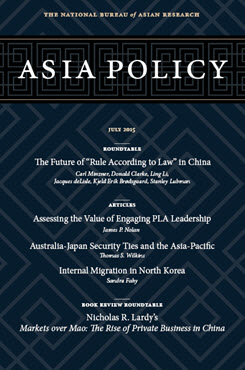The Rule of Law with Xi-Era Characteristics
Law for Economic Reform, Anticorruption, and Illiberal Politics
This essay is part of the roundtable “The Future of ‘Rule According to Law’ in China.”
Jacques deLisle is the Stephen A. Cozen Professor of Law and Professor of Political Science, as well as Deputy Director of the Center for the Study of Contemporary China, at the University of Pennsylvania.
Xi Jinping and China’s fifth-generation leadership have given law even greater pride of place in official rhetoric than their predecessors did. The October 2014 Fourth Plenum of the 18th Central Committee—widely dubbed the “rule of law plenum”—declared the rule of law to be a guiding force in pursuing the Chinese Communist Party’s major tasks, including economic development, political modernization, and realization of Xi’s “China dream.” After the Fourth Plenum, Xi included “comprehensively governing the country according to law” among his “Four Comprehensives,” which also included other goals that law is expected to advance (deepening reform, building prosperity, and limiting party misbehavior). These statements amplified earlier commitments to law, including Xi’s declaration in 2012 on the 30th anniversary of the 1982 constitution that China “must firmly establish throughout society, the authority of the constitution and the law,” and the seminal Third Plenum’s pledges in 2013 to “move forward with building a rule of law country,” “strengthen rule of law guarantees,” and “safeguard the authority of the constitution and the laws.” [1] This emphasis on law contrasts with decline in official support for law during much of the Hu Jintao period, which was marked by an emphasis on informal dispute resolution, skepticism toward the idea that the courts should be guided primarily by law, and an apparent sense that law had failed to fulfill its promise in advancing the regime’s aims.
At the same time, one of the most dramatic initiatives of Xi’s early tenure—a remarkably energetic drive against corruption—has been conducted primarily through the party’s extralegal discipline inspection commission under the leadership of Politburo Standing Committee member and venerable regime trouble-shooter Wang Qishan. Advocates of more robust constitutionalism, rights protection lawyers, and law-focused NGOs have all faced heightened repression since Xi came to power.
These seemingly contradictory trends are consistent with a relatively coherent conception of law’s roles that has deep roots in the reform era and has been evolving under Xi. Throughout the Deng Xiaoping, Jiang Zemin, and Hu Jintao periods, law came to be expected to perform—and to some extent did perform—supporting functions for the regime’s core agenda: providing frameworks for market-oriented, internationally open development strategies; checking potentially development-subverting misbehavior, much of it by party-state or state-linked actors; and preempting pressures for democratic reform. Incipient and likely non-transformative changes in law’s mandate under Xi point toward a legal order that is still reformist and developmentalist (in its notion of law’s role in the economy), more legalist (that is, giving law a larger role in some, but not all, areas), and more Leninist (in the sense of being less liberal, more top-down, and more narrowly instrumentalist). As the sections of this essay examine in turn, the fifth-generation leadership’s strategy appears to imply a large role for law in economic reform, a limited but perhaps growing role for law in addressing corruption and other party-state-based threats to economic development and effective governance, and a mostly, but not entirely, repressive role for law in handling pressures for political change. As this essay also discusses, factors beyond Chinese leaders’ control constrain their options in “ruling the country according to law.”
Endnotes
[1] “Xi Jinping Pledges to Implement Rule of Law,” China Daily, December 4, 2012; “Communiqué of the Third Plenum of the 18th Central Committee,” November 12, 2013, par. 14; and Central Committee of the Chinese Communist Party, “Decision Concerning Some Major Questions in Comprehensively Deepening Reform,” November 12, 2013, XII.47, IX.30.
About Asia Policy
Asia Policy is a peer-reviewed scholarly journal presenting policy-relevant academic research on the Asia-Pacific that draws clear and concise conclusions useful to today’s policymakers. Asia Policy is published quarterly in January, April, July, and October and accepts submissions on a rolling basis. Learn more


